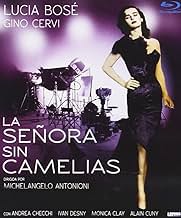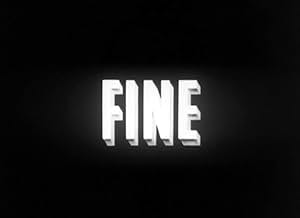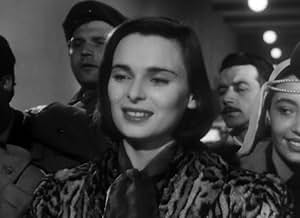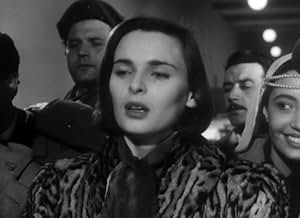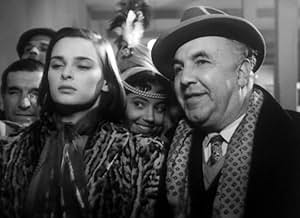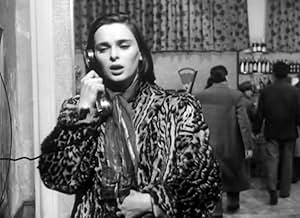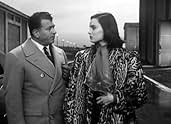IMDb रेटिंग
7.1/10
2.4 हज़ार
आपकी रेटिंग
अपनी भाषा में प्लॉट जोड़ेंA new starlet is discovered and has ups and downs in Italian films.A new starlet is discovered and has ups and downs in Italian films.A new starlet is discovered and has ups and downs in Italian films.
- पुरस्कार
- कुल 1 जीत
Antonio Acqua
- Movie Theatre Owner
- (बिना क्रेडिट के)
Emma Druetti
- Simonetta Rota's Mother
- (बिना क्रेडिट के)
Rita Giannuzzi
- Simonetta Rota's Friend
- (बिना क्रेडिट के)
Vittorio Manfrino
- Clara Manni's Father
- (बिना क्रेडिट के)
फ़ीचर्ड समीक्षाएं
Early Antonioni and although he is clearly feeling his way there are already signs of what is to become. We open with a fairly busy street scene and it becomes apparent the camera is following a woman along the pavement as first she pauses at an advertising poster and then approaches a cinema entrance. We only see her from behind and she enters the cinema to see the closing moments of herself on screen. It will later become apparent she is the star/victim of our picture. Later half the picture is taken up with a blank wall forming the corner of a street and a couple disappear behind it. There are several instances in sun and rain of cars and people walking across squares and beside buildings where the space is as important as those walking in its midst. Storywise the tale is more mundane. A naive young lady becomes committed to marriage without her knowledge, becomes involved elsewhere and the conflicts in her personal life are reflected in the conflicts in her working life in the cinema. Antonioni seems not to be a fan of popular cinema and if your vision is as sound and persuasive as his would prove to be maybe this is fine and another kind of popularity can be achieved but it is something of a stretch. Much cinema dismissed in the day as trash has survived with notable potency and resonance of the time and place whereas much arthouse cinema has disappeared without trace with charges of pretentiousness. Here we see the birth of Antonioni and whilst throughout his career he would construct scenarios railing against the men who presumed to control his icy maidens it would be his cinema eye, his certainty that place affects personality, that would carry most weight through his golden period from the late 50s up until his majestic and final great work, The Passenger.
10andrabem
Clara Manni (Lucia Bosé), a shop clerk, came to Rome in order to become an actress. She was discovered by Gianni (Andrea Checchi), a film producer. Now it seems that she's hit the big time. The film she's making now is bound to be a success. She's a star on the rise. Gianni, the producer, is in love with her, and rushes Clara into marriage with the complicity of her parents. She's not really in love with him but marries him all the same. Marriage at the time was a kind of moral (if not financial) safety certificate. This, by the time (1953), was almost mandatory for women.
The marriage is not successful and new roads, provided by chance, offer themselves to her. Clara is a sensitive woman, capable of deep emotions - she gives all of herself in whatever she does. But appearances seem to be more important than feelings in this world. In the end of the film, the tears she sheds while she's smiling, represent her surrender.
Lucia Bosé is superb in her role. Clara's need for love, her hesitations and hopes, are subtly shown - her acting is at the same time minimalistic and full of passion. More than the world of cinema, Antonioni portrays the world in which women had to live at that time. His look is deep and compassionate.
See a very beautiful and sad film about a "lady without camelias" - she lived, loved, suffered, and learned - in the end the flowers were gone and nothing remained but a smile among tears.
The marriage is not successful and new roads, provided by chance, offer themselves to her. Clara is a sensitive woman, capable of deep emotions - she gives all of herself in whatever she does. But appearances seem to be more important than feelings in this world. In the end of the film, the tears she sheds while she's smiling, represent her surrender.
Lucia Bosé is superb in her role. Clara's need for love, her hesitations and hopes, are subtly shown - her acting is at the same time minimalistic and full of passion. More than the world of cinema, Antonioni portrays the world in which women had to live at that time. His look is deep and compassionate.
See a very beautiful and sad film about a "lady without camelias" - she lived, loved, suffered, and learned - in the end the flowers were gone and nothing remained but a smile among tears.
While this is the third feature film of Michelangelo Antonioni, it would mark the second time that Lucia Bose had starred in his film, the first being Antonioni's debut feature Story of a Love Affair. As Lorenzo Cordelli pointed out, Antonioni's The Vanquished had made its debut at the Venice International Film Festival, and in this movie, it contains scenes from the Festival, thereby giving it a somewhat documentary feel as it serves as a backdrop. It tells the story of a fictional star, charting the meteoric rise and fall of her career, and made quite a statement on the Italian film industry of the time, which was producing more than 300 features annually.
Again, the female of the species turn out to be quite strong in character, while the male counterparts continue the trend of being rather meek, and lacking some alpha-male qualities befitting of a leading character status. Here, we have Lucia Bose's Clara Manni, a shopgirl from Milan who was talent spotted and brought to prominence on celluloid by film producer Dr Gianni Franchi, who together with the film world, fell in love with the dazzling beauty (Bose herself was crowed Miss Italia once before). In today's context, this would be akin to continued casting calls for any scream queen/sex siren/teenage starlet to be typecast in a role in their respective blockbusters, with nary an opportunity for them to venture out of the tried and tested, all in the name of profit.
Being rushed into marriage in the middle of a film production, we see how Gianni turns into a green-eyed monster, possessive of his trophy wife and chiding her for wanting to go along with the norm in getting herself casted in roles that require the revelation of some flesh, be it in steamy love scenes or in seductive poses in glossy magazine spreads. Granted, his idea of marriage is to have her become a homemaker given his wealth to provide her a more than comfortable life, but to Clara, it's akin to being imprisoned. So one will come to expect the usual marital woes that befall couples as fools who rush in, and find themselves smashing head on toward a rocky time.
In today's blockbuster world, I guess it's obvious that sex and violence sells. In those days, as explained by the producer character Ercole (Gino Cervi), sex, religion and politics in movies put bums on seats, which accounts for why scantily clad women could have been considered a de-facto "must-have" in order to appeal to the lowest denominator amongst audiences. To Gianni, in his good intent to want to elevate his wife's status to drama-mama, decided to make an art-house Joan of Arc (which we are spared the torture of watching, only provided glimpses of it), much against the common grain of film-making, and with Clara being bored to tears, decided to go along with the project.
With her Joan of Arc being both a critical and commercial failure, Clara becomes vulnerable. But here's where her character got interesting. Like Eve, she's fully aware of the forbidden apple, but yet found herself weak to resist the advances from a fan. She conscientiously knows of the destructive path she'll be walking down, both in reputation and personal life should she embark on an affair, but I guess the appeal that Mr Nardo (Ivan Desny) had, was being the wedge at the right point in time when she was emotionally at her weakest. Again, Nardo is a slimy male character that one would love to hate, given his motive of personal satisfaction in having to conquer a famous actress. However, you must salute his thick- skinned persistence and his great pretension, well hidden behind a suave demeanour.
The saddest character here remains Gianni Franchi. You'll realize that while he has the best of intentions for his wife, life would have it that her reaction to his concern would go unappreciated most of the time. And pride would come in the way when someone who had broken your heart once, come knocking on your door for an opportunity. As Clara's character develops, she slowly learns about her naiveness, and becomes more aware of the business side of the industry. Here's where the film becomes a critical mouthpiece of the state of Italian cinema at the time, which led to potential Claras dropping their willingness to star in the film lest they offend industry folks.
It makes comparisons and draws parallels between the exploitation of an actress's good looks, versus grooming them into serious thespians, and through Clara's bold reinvention of herself, one would have thought she would have learnt a valuable lesson to apply, given an about turn with her new found understanding and strength. But as it turns out, there's this invisible glass ceiling in place.
I thought the ending was one of the most powerful ones, and a definite heart-wencher, seen thus far. It has a resignation to Fate, that no matter how hard one tried, the outcome has already been pre-determined by the stars, and try as you might, you just cannot effect any change. The streaming of tears down the eye, while masking it as tears of joy and forcing a smile, probably reflects Clara's greatest acting moment to date, smiling to mask some extreme unhappiness toward her life and career choices, that she became nothing more than a train on a railroad, following the tracks laid out in front of her. The absolute last frame that lingers, is well worth a ticketed admission, for the fact that Clara finally got to act.
Again, the female of the species turn out to be quite strong in character, while the male counterparts continue the trend of being rather meek, and lacking some alpha-male qualities befitting of a leading character status. Here, we have Lucia Bose's Clara Manni, a shopgirl from Milan who was talent spotted and brought to prominence on celluloid by film producer Dr Gianni Franchi, who together with the film world, fell in love with the dazzling beauty (Bose herself was crowed Miss Italia once before). In today's context, this would be akin to continued casting calls for any scream queen/sex siren/teenage starlet to be typecast in a role in their respective blockbusters, with nary an opportunity for them to venture out of the tried and tested, all in the name of profit.
Being rushed into marriage in the middle of a film production, we see how Gianni turns into a green-eyed monster, possessive of his trophy wife and chiding her for wanting to go along with the norm in getting herself casted in roles that require the revelation of some flesh, be it in steamy love scenes or in seductive poses in glossy magazine spreads. Granted, his idea of marriage is to have her become a homemaker given his wealth to provide her a more than comfortable life, but to Clara, it's akin to being imprisoned. So one will come to expect the usual marital woes that befall couples as fools who rush in, and find themselves smashing head on toward a rocky time.
In today's blockbuster world, I guess it's obvious that sex and violence sells. In those days, as explained by the producer character Ercole (Gino Cervi), sex, religion and politics in movies put bums on seats, which accounts for why scantily clad women could have been considered a de-facto "must-have" in order to appeal to the lowest denominator amongst audiences. To Gianni, in his good intent to want to elevate his wife's status to drama-mama, decided to make an art-house Joan of Arc (which we are spared the torture of watching, only provided glimpses of it), much against the common grain of film-making, and with Clara being bored to tears, decided to go along with the project.
With her Joan of Arc being both a critical and commercial failure, Clara becomes vulnerable. But here's where her character got interesting. Like Eve, she's fully aware of the forbidden apple, but yet found herself weak to resist the advances from a fan. She conscientiously knows of the destructive path she'll be walking down, both in reputation and personal life should she embark on an affair, but I guess the appeal that Mr Nardo (Ivan Desny) had, was being the wedge at the right point in time when she was emotionally at her weakest. Again, Nardo is a slimy male character that one would love to hate, given his motive of personal satisfaction in having to conquer a famous actress. However, you must salute his thick- skinned persistence and his great pretension, well hidden behind a suave demeanour.
The saddest character here remains Gianni Franchi. You'll realize that while he has the best of intentions for his wife, life would have it that her reaction to his concern would go unappreciated most of the time. And pride would come in the way when someone who had broken your heart once, come knocking on your door for an opportunity. As Clara's character develops, she slowly learns about her naiveness, and becomes more aware of the business side of the industry. Here's where the film becomes a critical mouthpiece of the state of Italian cinema at the time, which led to potential Claras dropping their willingness to star in the film lest they offend industry folks.
It makes comparisons and draws parallels between the exploitation of an actress's good looks, versus grooming them into serious thespians, and through Clara's bold reinvention of herself, one would have thought she would have learnt a valuable lesson to apply, given an about turn with her new found understanding and strength. But as it turns out, there's this invisible glass ceiling in place.
I thought the ending was one of the most powerful ones, and a definite heart-wencher, seen thus far. It has a resignation to Fate, that no matter how hard one tried, the outcome has already been pre-determined by the stars, and try as you might, you just cannot effect any change. The streaming of tears down the eye, while masking it as tears of joy and forcing a smile, probably reflects Clara's greatest acting moment to date, smiling to mask some extreme unhappiness toward her life and career choices, that she became nothing more than a train on a railroad, following the tracks laid out in front of her. The absolute last frame that lingers, is well worth a ticketed admission, for the fact that Clara finally got to act.
A usually neglected Michelangelo Antonioni early film, "The Lady without Camelias" is a caustic story about a beautiful Milanese shop clerk (Lucia Bosé) who briefly becomes a movie star. She soon discovers than she is fenced in and humiliated, with a new and rich husband who can't tolerate her romantic scenes -- he prefers her to play Joan of Arc, with disastrous consequences.
It is actually one of the cruelest and most accurate portraits of studio film-making and the Italian movie world. As the film develops, it only gets better, the last scene being a little masterpiece of its own. Michelangelo Antonioni, who had already worked with Bosé on "Chronicle of a Love Affair", offered her the part of Clara after Lollobrigida (and, it is said, Loren) had turned it down, and she does wonders in one of her best parts on the silver screen. I have never been really touched by Antonioni's (much more famous, much more serious) Trilogy, but I have enjoyed this "minor" work. Compared to later Antonioni, the film feels crowded, yet some of the director's favorite themes are already there (most notably, misunderstanding between men and women, and masculine weakness). For those (like me) who always found Antonioni quite hard to follow in his later films, try this bitter tale in post-war Italy, I think it gives a different and lighter approach to this director's work.
It is actually one of the cruelest and most accurate portraits of studio film-making and the Italian movie world. As the film develops, it only gets better, the last scene being a little masterpiece of its own. Michelangelo Antonioni, who had already worked with Bosé on "Chronicle of a Love Affair", offered her the part of Clara after Lollobrigida (and, it is said, Loren) had turned it down, and she does wonders in one of her best parts on the silver screen. I have never been really touched by Antonioni's (much more famous, much more serious) Trilogy, but I have enjoyed this "minor" work. Compared to later Antonioni, the film feels crowded, yet some of the director's favorite themes are already there (most notably, misunderstanding between men and women, and masculine weakness). For those (like me) who always found Antonioni quite hard to follow in his later films, try this bitter tale in post-war Italy, I think it gives a different and lighter approach to this director's work.
"La Signora senza Camelie" is arguably Antonioni's first masterpiece. It's about a shop-girl 'discovered' by an ambitious producer who doesn't just want to make her a star but his wife as well and who then proceeds to make her miserable. It's not a great film about the cinema but then that's hardly the point; rather you can see in it the seeds of his later films about unhappy women and mentally abusive men.
As the unfortunate Clara, rich and bored like so many Antonioni heroines, the little known Lucia Bose is excellent and visually it is often extraordinary. It doesn't quite fit into the broader and deeper contextualization of the trilogy that began with "L'Avventura" but in its treatment of its heroine it is unmistakably the work of its director and it's a much more intellectually rigorous picture than anything his contemporaries was doing at the time, For anyone remotely interested in following the trajectory of Antonioni's career this is essential viewing.
As the unfortunate Clara, rich and bored like so many Antonioni heroines, the little known Lucia Bose is excellent and visually it is often extraordinary. It doesn't quite fit into the broader and deeper contextualization of the trilogy that began with "L'Avventura" but in its treatment of its heroine it is unmistakably the work of its director and it's a much more intellectually rigorous picture than anything his contemporaries was doing at the time, For anyone remotely interested in following the trajectory of Antonioni's career this is essential viewing.
क्या आपको पता है
- ट्रिवियाMichelangelo Antonioni offered the lead to Lucia Bosè after both Gina Lollobrigida and Sophia Loren turned it down.
- भाव
Clara Manni: I was thinking of eternal love, all he wanted was an affair with a film star. And he got it.
- कनेक्शनFeatured in Michelangelo Antonioni storia di un autore (1965)
टॉप पसंद
रेटिंग देने के लिए साइन-इन करें और वैयक्तिकृत सुझावों के लिए वॉचलिस्ट करें
- How long is The Lady Without Camelias?Alexa द्वारा संचालित
विवरण
- चलने की अवधि1 घंटा 41 मिनट
- रंग
- ध्वनि मिश्रण
- पक्ष अनुपात
- 1.37 : 1
इस पेज में योगदान दें
किसी बदलाव का सुझाव दें या अनुपलब्ध कॉन्टेंट जोड़ें

टॉप गैप
By what name was La signora senza camelie (1953) officially released in Canada in English?
जवाब
![Trailer [OV] देखें](https://m.media-amazon.com/images/M/MV5BMmVmZGM2NWQtMWZkNS00ZmI5LWEwMjctOTE2Njc4MjRiYmFlXkEyXkFqcGdeQXRyYW5zY29kZS13b3JrZmxvdw@@._V1_QL75_UX500_CR0)
